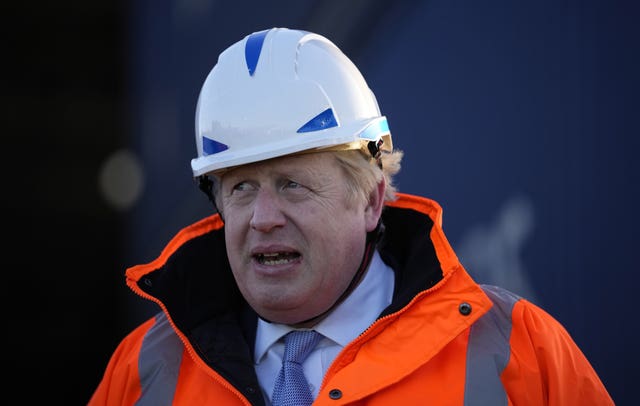
Vanessa Feltz 3pm - 6pm
31 January 2022, 16:04

The document outlines the plan to save £1 billion by eradicating inherited EU red tape.
The Prime Minister has said his Government plans on “firmly planting the British flag on the world stage once again” after it set out its vision for capitalising on Brexit’s opportunities.
Boris Johnson, in his foreword to the UK Government’s The Benefits Of Brexit paper, said that the “bolder” the UK is in targeting opportunities afforded by leaving the European Union, the “greater the gains will be for us all”.
The document was published on Monday to mark the second anniversary of Britain’s divorce from Brussels, with it setting out the plan for altering what Brussels-made laws will be kept or scrapped, including ambitions to save £1 billion for businesses by cutting inherited EU red tape.
We’re going further and faster to maximise the benefits of Brexit 🇬🇧 pic.twitter.com/x8goR59cXZ
— Boris Johnson (@BorisJohnson) January 31, 2022
The 102-page Cabinet Office document also lays out the five-step approach to forging new post-Brexit, UK-specific regulations, pledging to “use our new freedom to act quickly and nimbly” in a bid to create “better markets”.
Other changes, including making trade documents digital and streamlining procurement rules, are proposed in a bid to save billions of pounds for British businesses.
Mr Johnson said Brexit’s exit from the bloc on January 31 2020 marked “not the final page of the story, but the start of a whole new chapter”.
He predicted a “future in which we don’t sit passively outside the European Union but seize the incredible opportunities that our freedom presents and use them to build back better than ever before – making our businesses more competitive and our people more prosperous”.
The Prime Minister continued: “Untangling ourselves from 40 years of EU membership, keeping what works, changing what doesn’t, supporting new industries, reinvigorating older ones and firmly planting the British flag on the world stage once again.
“This is a hugely exciting time for our country, one filled with potential and opportunity. The bolder we are, the greater the gains will be for us all.”
The publication of the paper comes after Downing Street announced it will bring forward a “Brexit Freedoms” Bill to make it easier to amend outdated EU law – a target that is expanded upon within the scoping paper.

The Bill will affect the handling of retained EU law – Brussels-made regulations which were preserved in the UK statute book for legal continuity after the Brexit transition period ended in 2020.
With primary legislation required currently to change even minor details from the body of retained law, No 10 has argued it would take “several years” to change or scrap outdated rules.
The reformed plan is to instead allow the “acquis” of laws to be amended by way of secondary legislation to allow for “agile regulation”. Critics say the change will help to dilute Parliament’s oversight of rule changes by ministers.
Speaking to broadcasters in Essex on Monday, the Prime Minister said that, while the UK will not diverge from the EU rulebook “for the sake of it”, the legislation will help secure investment in cutting-edge technologies.
“There are things we can do differently and we think in a way that will encourage business to invest even more,” the Prime Minister told broadcasters during a visit to Tilbury Docks.
This perhaps shows Frost's lasting impact. He took a very broad view of Brexit opportunities – far beyond finding specific EU laws we wanted to change – and wanted a wider 'mindset shift' on regulation more broadly. His plans also had a whiff of empire building in Whitehall…
— Joe Marshall (@Joe_Marshall0) January 31, 2022
“In all the areas where the UK is strong – cyber, artificial intelligence, all the cutting-edge technologies of the future – we are going to make sure we do things differently and better, where appropriate.”
The Benefits Of Brexit paper lists a number of areas where the UK Government hopes to allow for advancement, including by: making it faster and easier to run clinical health trials; paving the way for quantum technologies research; removing “burdensome” EU regulations on Britain’s wine sector; and allowing the country to take advantage of advancements in autonomous vehicles and drone technology.
Joe Marshall, a senior researcher at the Institute for Government, said the document appeared to demonstrate the “lasting impact” of the influence of Lord Frost, the former UK negotiator and Brexit minister who quit the Government in December.
“He took a very broad view of Brexit opportunities – far beyond finding specific EU laws we wanted to change – and wanted a wider ‘mindset shift’ on regulation more broadly,” Mr Marshall tweeted.
“His plans also had a whiff of empire building in Whitehall…”
Meanwhile, Foreign Secretary Liz Truss has said she had a “good call” with European Commission vice president Maros Sefcovic ahead of further talks this week to try to resolve the impasse over the Northern Ireland Protocol.